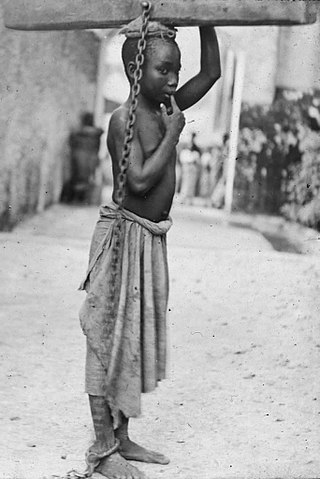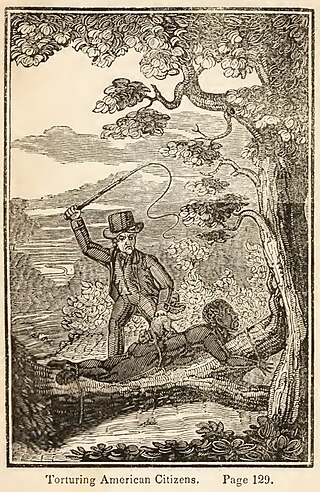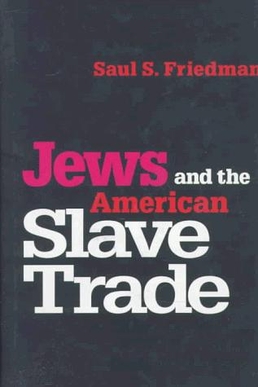Related Research Articles

Slavery is the ownership of a person as property, especially in regards to their labor. Slavery typically involves compulsory work with the slave's location of work and residence dictated by the party that holds them in bondage. Enslavement is the placement of a person into slavery, and the person is called a slave or an enslaved person.

Abolitionism, or the abolitionist movement, is the movement to end slavery and liberate enslaved people around the world.

The Atlantic slave trade or transatlantic slave trade involved the transportation by slave traders of enslaved African people, mainly to the Americas. The outfitted European slave ships of the slave trade regularly used the triangular trade route and its Middle Passage, and existed from the 16th to the 19th centuries. The vast majority of those who were transported in the transatlantic slave trade were from Central and West Africa who had been sold by West African slave traders mainly to Portuguese, British, Spanish, Dutch, and French slave traders, while others had been captured directly by the slave traders in coastal raids; European slave traders gathered and imprisoned the enslaved at forts on the African coast and then brought them to the Americas. Except for the Portuguese, European slave traders generally did not participate in the raids because life expectancy for Europeans in sub-Saharan Africa was less than one year during the period of the slave trade.

The legal institution of human chattel slavery, comprising the enslavement primarily of Africans and African Americans, was prevalent in the United States of America from its founding in 1776 until 1865, predominantly in the South. Slavery was established throughout European colonization in the Americas. From 1526, during the early colonial period, it was practiced in what became Britain's colonies, including the Thirteen Colonies that formed the United States. Under the law, an enslaved person was treated as property that could be bought, sold, or given away. Slavery lasted in about half of U.S. states until abolition in 1865, and issues concerning slavery seeped into every aspect of national politics, economics, and social custom. In the decades after the end of Reconstruction in 1877, many of slavery's economic and social functions were continued through segregation, sharecropping, and convict leasing.

Herbert Aptheker was an American Marxist historian and political activist. He wrote more than 50 books, mostly in the fields of African-American history and general U.S. history, most notably, American Negro Slave Revolts (1943), a classic in the field. He also compiled the 7-volume Documentary History of the Negro People (1951–1994). In addition, he compiled a wide variety of primary documents supporting study of African-American history. He was the literary executor for W. E. B. Du Bois.

The history of slavery spans many cultures, nationalities, and religions from ancient times to the present day. Likewise, its victims have come from many different ethnicities and religious groups. The social, economic, and legal positions of enslaved people have differed vastly in different systems of slavery in different times and places.

Ira Berlin was an American historian, professor of history at the University of Maryland, and former president of Organization of American Historians.

Slavery has historically been widespread in Africa. Systems of servitude and slavery were common in parts of Africa in ancient times, as they were in much of the rest of the ancient world. When the trans-Saharan slave trade, Indian Ocean slave trade and Atlantic slave trade began, many of the pre-existing local African slave systems began supplying captives for slave markets outside Africa. Slavery in contemporary Africa is still practiced despite it being illegal.

The abolition of slavery occurred at different times in different countries. It frequently occurred sequentially in more than one stage – for example, as abolition of the trade in slaves in a specific country, and then as abolition of slavery throughout empires. Each step was usually the result of a separate law or action. This timeline shows abolition laws or actions listed chronologically. It also covers the abolition of serfdom.

This timeline of events leading to the American Civil War is a chronologically ordered list of events and issues that historians recognize as origins and causes of the American Civil War. These events are roughly divided into two periods: the first encompasses the gradual build-up over many decades of the numerous social, economic, and political issues that ultimately contributed to the war's outbreak, and the second encompasses the five-month span following the election of Abraham Lincoln as President of the United States in 1860 and culminating in the capture of Fort Sumter in April 1861.
Joseph Calder Miller was an American historian and academic. He served at the University of Virginia from 1972 to 2014 as T. Cary Johnson Jr. professor of history, and was a fellow of the American Academy of Arts and Sciences. As a historian, Joseph wrote extensively on the early history of Africa, especially Angola, the Atlantic slave trade, women and slavery, child slavery, Atlantic history, and world history.

Ana Lucia Araujo is an American historian, art historian, author, and professor of history at Howard University. She is a member of the International Scientific Committee of the UNESCO Slave Route Project. Her scholarship focuses on the transnational history, public memory, visual culture, and heritage of slavery and the Atlantic slave trade.

Slavery has existed in various forms throughout the history of Nigeria, notably during the Atlantic slave trade and Trans-Saharan trade. Slavery is now illegal internationally and in Nigeria. However, legality is often overlooked with different pre-existing cultural traditions, which view certain actions differently. In Nigeria, certain traditions and religious practices have led to "the inevitable overlap between cultural, traditional, and religious practices as well as national legislation in many African states" which has had the power to exert extra-legal control over many lives resulting in modern-day slavery. The most common forms of modern slavery in Nigeria are human trafficking and child labor. Because modern slavery is difficult to recognize, it has been difficult to combat this practice despite international and national efforts.

Jews and the American Slave Trade is a 1998 book by American historian Saul S. Friedman published by the Transaction Publishers. It focuses on the Jewish involvement in the American slave trade and is a polemical rebuttal against the 1991 work The Secret Relationship Between Blacks and Jews. It has also been described as contributing to the contemporary debates related to African American–Jewish relations.
Jeffrey R. Kerr-Ritchie, is a British historian and professor at Howard University in Washington, D.C.
Dickson "Dave" Davies Bruce Jr. was a history professor and author in the United States whose research focused on cultural and intellectual history of African Americans. He taught at the University of California at Irvine. He received the James Mooney Award from the Southern Anthropological Society in 1973 for his book And They All Sang Hallelujah.
Martin A. Klein is an Africanist and an emeritus professor in the History Department at the University of Toronto specialising in the Atlantic slave trade, and francophone West Africa: Senegal, Guinea, and Mali. He obtained a Bachelor of Arts degree in journalism at Northwestern University (1951-1955) and a Master of Arts and Doctor of Philosophy in history at the University of Chicago (1957-1964). Klein worked as an assistant professor at the University of California Berkeley from 1965 till 1970, later teaching African history at the University of Toronto as an associate professor and later full professor from 1970 until his retirement in 1999. As a Fulbright Fellow, Klein taught for a year at Lovanium University in Kinshasa.

This is a bibliography of works regarding the internal or domestic slave trade in the United States (1775–1865, with a measurable increase in activity after 1808, following the Act Prohibiting Importation of Slaves).
This bibliography of slavery in the United States is a guide to books documenting the history of slavery in the U.S., from its colonial origins in the 17th century through the adoption of the 13th Amendment to the Constitution, which officially abolished the practice in 1865. In addition, links are provided to related bibliographies and articles elsewhere in Wikipedia.
References
- Miller, Joseph C. (1993). Slavery and Slaving in World History: A Bibliography, Volume I, 1900—1991. Millwood, NY: Kraus International Publications. ISBN 0-527-63660-6.
- —— (1999). Slavery and Slaving in World History: A Bibliography, Volume II, 1992—1996. Armonk, NY: M.E. Sharpe, Inc. ISBN 0-765-60279-2.
- —— (1985). Slavery: A Worldwide Bibliography, 1900-1982. White Plains, NY: Kraus International Publications. ISBN 0-527-63659-2.
- —— (1977). Slavery, a Comparative Teaching Bibliography. Waltham, MA: Crossroads Press (for African Studies Association).